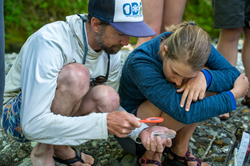
Professor Daryl Teittenen (left) of SNC Tahoe at the river’s edge, with a student scientist.
By working and learning in the ecosystems that require attention, the RIVER-FSN provides students with education and experience to understand and address the challenges impacting river systems.
INCLINE VILLAGE, Nev. (PRWEB)
October 01, 2019
SNC Tahoe joins educational consortium to build RIVER Field Studies Network
Freshwater systems are under threat. Non-Native plants and animals, nutrient pollution, growing population pressures, and newly-identified concerns like microplastics – this is just the shortlist of diverse and often synergistic pressures our freshwater resources face. To help student-scientists of the future address these issues, Dr. Andy Rost, of Sierra Nevada College, joins forces with Dr. James Vonesh of Virginia Commonwealth University and Dr. Danielle Perry of Northern Arizona University through a grant from the National Science Foundation. Drs. Rost, Vonesh and Perry will work with seven other researchers from around the country. Their mission? As principal investigators, build a framework for the River-based Immersive Education and Research Field Studies Network (RIVER-FSN). The RIVER-FSN takes some of its cues from the Organization for Tropical Studies, focusing on Undergraduate Biology Education. The network’s participants intend to guide new development of river-based field studies curriculum and programs.
Building a network for collaborative and comparative research
By working and learning in the ecosystems that require attention, the RIVER-FSN provides students with education and experience to understand and address the challenges impacting river systems. Using these freshwater systems as field sites, Vonesh, Perry, and Rost are building a network of researchers, trainers, and collaborators. Once complete, the RIVER-FSN will employ active site experiences and build broader connections throughout the field of undergraduate biology curriculum.
A vital system for field experience
The network and incubator, its capacities, and challenges are vital for many reasons. Rivers are natural classrooms for STEM learning, with processes that integrate biology, hydrology, geology, human, and natural systems. Rivers also provide essential services to society at large, while being among the most imperiled ecosystems. Because of these and many other features, they offer unique solutions for many barriers to student field studies.
Engaged students and the communities they learn in
“Engaging students in expeditionary research holds exceptional promise for biology education due to the breadth and importance of river research, the immersive nature of river expeditions, and the use of high-impact active learning pedagogy,” states their project overview. As an incubator project, RIVER-FSN seeks to bring together a community already invested independently in river-based field studies and expands opportunities for collaborative research and information sharing.
Funding to build a network of active learning
The RIVER-FSN builds capacity for active-learning environments that also includes comparative river biology. Beginning with a series of workshops, the project will identify topics, create expectations, and establish communications channels. The first of these workshops takes place on the American River, hosted by Dr. Rost and professor Daryl Teittenen of SNC Tahoe. Jointly funded by the Directorate for Biological Sciences, Division of Biological Infrastructure, and the Directorate for Education and Human Resources– Division of Undergraduate Education, the RIVER-FSN is part of the effort to address the challenges posed in Vision and Change in Undergraduate Biology Education: A Call to Action (http://visionandchange.org/finalreport/).
Share article on social media or email:

